 Inspired to What End?
Inspired to What End?
One day, after church, someone said to me, “I am so inspired.” In my heart, I responded, “Inspired to what end.” It isn’t enough to be inspired. We must be moved to action.
Over the years, I have read many books, articles and attended events that have inspired me. Just as often, I have let that inspiration lay dormant until it died away. I watch this happen to others. It’s sad because we desire to grow, change, and create. That is how we were made, and when inspired, these desires roar to life.
Why do we so often let inspiration to change and grow, die?
Why aren’t we moved to action and then achieve results? I can only speak from my own experience, but it has been extensive on both sides of this coin.
• There are so many things that I am inspired to do or change that I burn out.
I hurry home and begin tearing my life’s fabric apart to insert this system or that program or a new way of managing. Then what happens? In a couple of weeks or a month, maybe two, I’ve quit. I’m back to being and doing what I did before. I’m burnt out.
• I feel that I must do some BIG thing to have any real impact.
• I am inconsistent, and when I don’t see the results I want as quickly as I want, it is easy to quit.
• I let myself get distracted by the many other pressing issues of my daily life. I get up every day determined to put my one step into action, but there are kids to chauffeur, food to cook, dishes to do, and I have a job. It sucks up the time until there is nothing left, and the one-step is on hold.
Those are not all the reasons inspiration dies, but they are right up there at the top of the list. Here is what I have learned to do when I am inspired and want to see results.
Nine Ways to Achieve Results
1. PICK ONE thing that you will work on out of all that has inspired you, just one thing.
The workbook that accompanies Becoming a Present Parent helps readers distill the entire book down to one thing. That is key—only ONE thing. Ask, “What’s the one best thing I should work on first”—what is the one thing you feel you need to do?
2. BREAK what you want into smaller steps.
We need to isolate one small thing that we can implement to move us in the direction we want to go. When we multiply small amounts of time consistently, we can accomplish magnificent things. We can change our part of the world.
Whenever you hear that a person has achieved an extraordinary goal, rarely, if ever, are you told the process they used—that is, the everyday actions they took consistently. You only hear about the outcome. So, begin with one small step.
3. COMMIT to being consistent for as long as it takes.
Some of our family goals will take many years to come to fruition, as will many of our personal goals. “There’s a difference between interest and commitment. When you’re interested in doing something, you do it only when it’s convenient. When you’re committed to something, you accept no excuses – only results.”—Kenneth H. Blanchard
4. REMEMBER being consistent is not the same as being perfect.
James Clear reported in the magazine Entrepreneur that research shows, regardless of the habit you’re working to build or change, the character trait you want to develop, or the family culture you’re working on, missing a single day has no measurable impact on your long-term success. He wrote, “Daily failures are like red lights during a road trip. When you’re driving a car, you’ll come to a red light every now and then. But if you maintain a good average speed, you’ll always make it to your destination despite the stops and delays along the way.” Change takes time. Growth takes time. Perfect is not the goal; progress is!
5. Make space.
Create a system for getting your small step done each day. For example, every day, I make my bed immediately upon arising. Sometimes I can only make my half. But I do it every day. It isn’t about the bed. It is one of the steps I take daily to practice consistency and make space. Then while in the bathroom first thing in the morning, I pray. If I leave the bathroom, I may not get to it because life has a way of interfering. Determine how you can fit your one step into your life every day and then keep that commitment. When I was working on controlling my temper many years ago, I had to create space for reflection, make time to get help from others who had accomplished what I wanted to accomplish, and find ways to nurture myself as I did the work. Whatever your one-step, make space to do it every day.
6. KEEP your word.
Do what you’ve decided to do. Be as consistent as possible. No matter how long it takes, don’t quit. Keep your word to yourself!
Keeping your word is essential. The more you do it, the more you learn to trust yourself, others begin to trust you, and it builds trust with your children. When your kids see you being consistent for as long as it takes, it tells them, “You can trust me!”
8. FOCUS on today—it’s all you have to work with.
As you focus on one day at a time, you will be able to persevere. Do your best today. If
you don’t do well today, then when tomorrow is today, begin again. Once today is yesterday, let it go! Don’t quit!
9. BELIEVE the result will be exponential growth.
When you make a change, create something new, or adjust your way of being, it has a domino effect in your life and other things that matter to you, that you aren’t focusing on, begin to change. Even though you are only working on one thing at a time, taking one small step at a time, hold in your mind that more than one item will set itself right in your life. I know this is true because I have experienced it.
As you work on the one best thing, as you move forward one small step at a time, and as you commit to making space for this step in your life and then remain consistent, you will be amazed at the marvelous things you can accomplish.

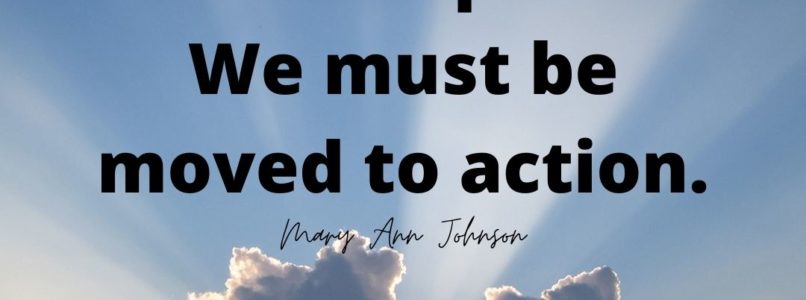
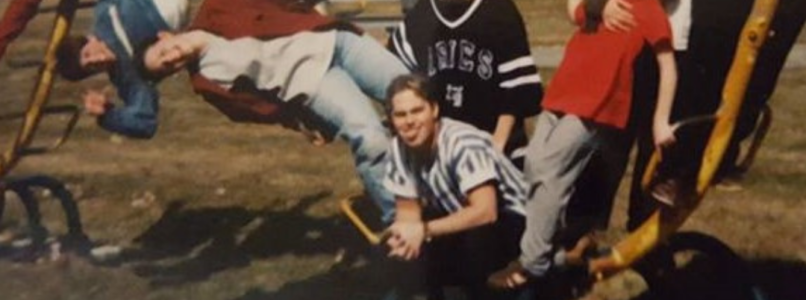
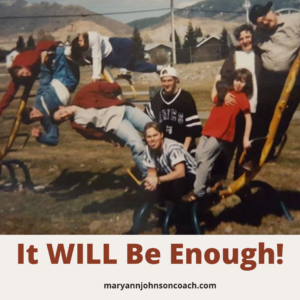 I received a gift on my Birthday
I received a gift on my Birthday 
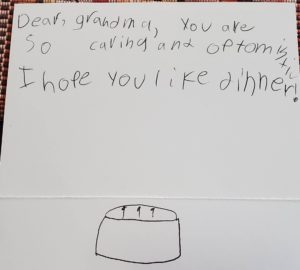

 Recently, I had an interesting conversation with a friend and mentee. We were talking about some concepts found in my book, Becoming a Present Parent. She said, “The problem with your book is it’s so simple. I loved it when I read it, and it was all so doable. Then two months later, in an overwhelmed moment, I asked myself, ‘Can it really be this simple.'”
Recently, I had an interesting conversation with a friend and mentee. We were talking about some concepts found in my book, Becoming a Present Parent. She said, “The problem with your book is it’s so simple. I loved it when I read it, and it was all so doable. Then two months later, in an overwhelmed moment, I asked myself, ‘Can it really be this simple.'” Some years ago, I decided to find out what I could do to improve my life the most.
Some years ago, I decided to find out what I could do to improve my life the most. 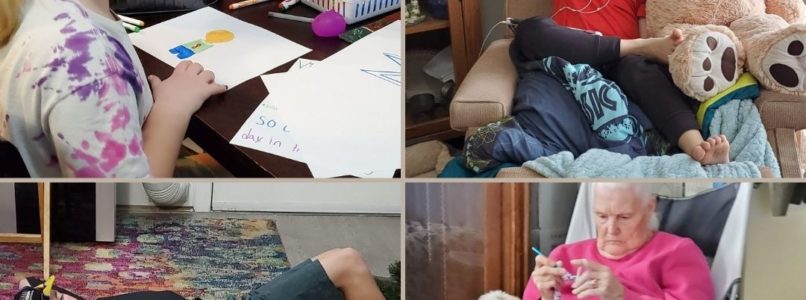
 Sometimes I think back
Sometimes I think back 
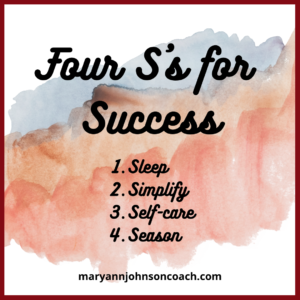 I gave up New Year’s Resolutions many years ago. I always felt set up for failure. I have found it more useful to periodically evaluate how I am managing my life, how I am feeling about it, and what simple adjustments I could make so that I fare better. I emphasize the word simple. I also keep the list short! I want success and not overwhelm.
I gave up New Year’s Resolutions many years ago. I always felt set up for failure. I have found it more useful to periodically evaluate how I am managing my life, how I am feeling about it, and what simple adjustments I could make so that I fare better. I emphasize the word simple. I also keep the list short! I want success and not overwhelm. one on Dec. 30. This Christmas, both sets of parents pondered what to
one on Dec. 30. This Christmas, both sets of parents pondered what to  do about their Christmas trees. They have older children. They like their homes to look festive. In the end, they adjusted for the season they are in. One kept all the ornaments on the top half of the tree. The other had a very small tree on a tabletop. It isn’t what they love or do every year, but it is what they did this year. Your season matters and when you honor the season you find yourself in, things feel more peaceful. They could have spent the whole season spanking baby hands or grieving over broken family mementos. But they choose to respect the season their family was in.
do about their Christmas trees. They have older children. They like their homes to look festive. In the end, they adjusted for the season they are in. One kept all the ornaments on the top half of the tree. The other had a very small tree on a tabletop. It isn’t what they love or do every year, but it is what they did this year. Your season matters and when you honor the season you find yourself in, things feel more peaceful. They could have spent the whole season spanking baby hands or grieving over broken family mementos. But they choose to respect the season their family was in.
 I have a friend, Audrey Rindlisbacher, and recently I was listening to an early morning Facebook Live she did. The topic was ‘comparison.’ Audrey is an exceptional woman who has been speaking and teaching for years on great books. I have sat with rapt attention in her classes. She inspires me with her knowledge of natural law and principles.
I have a friend, Audrey Rindlisbacher, and recently I was listening to an early morning Facebook Live she did. The topic was ‘comparison.’ Audrey is an exceptional woman who has been speaking and teaching for years on great books. I have sat with rapt attention in her classes. She inspires me with her knowledge of natural law and principles.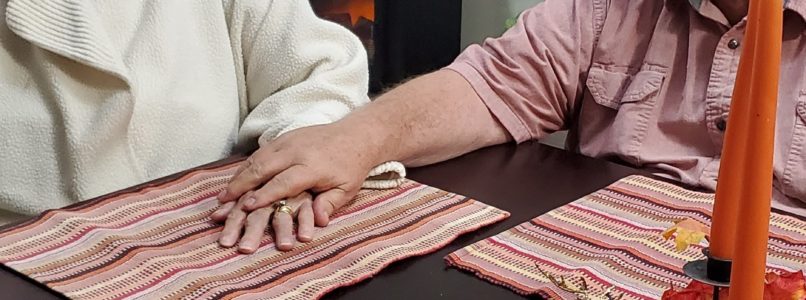
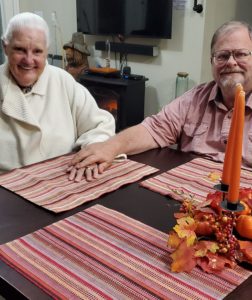 I have always had a dining room or kitchen table. Even in our first home, which was small, we had a table. I loved having a table. It was good to rest my elbows when I was reading or studying.
I have always had a dining room or kitchen table. Even in our first home, which was small, we had a table. I loved having a table. It was good to rest my elbows when I was reading or studying.

 music and the dancing that brought the spark to the surface. But it wasn’t. Remember that talk I had with God? I didn’t just complain about loss, age, passing time, etc. I asked what I could do to feel ‘in love.’ Not only “I care” or “I love you,” but ‘in love.” If you’ve been there, then you know what I am talking about.
music and the dancing that brought the spark to the surface. But it wasn’t. Remember that talk I had with God? I didn’t just complain about loss, age, passing time, etc. I asked what I could do to feel ‘in love.’ Not only “I care” or “I love you,” but ‘in love.” If you’ve been there, then you know what I am talking about. It has been a few days since the miracle and Don, and I are still connecting in small ways. We are talking more softly and listening more intently. Saturday afternoon, while our granddaughter Maggie watched Mother Goose Playhouse, we held hands and danced in place for just a moment. : ) If I keep focusing on his strengths and gifts and keep thanking him for them, it will last.
It has been a few days since the miracle and Don, and I are still connecting in small ways. We are talking more softly and listening more intently. Saturday afternoon, while our granddaughter Maggie watched Mother Goose Playhouse, we held hands and danced in place for just a moment. : ) If I keep focusing on his strengths and gifts and keep thanking him for them, it will last.